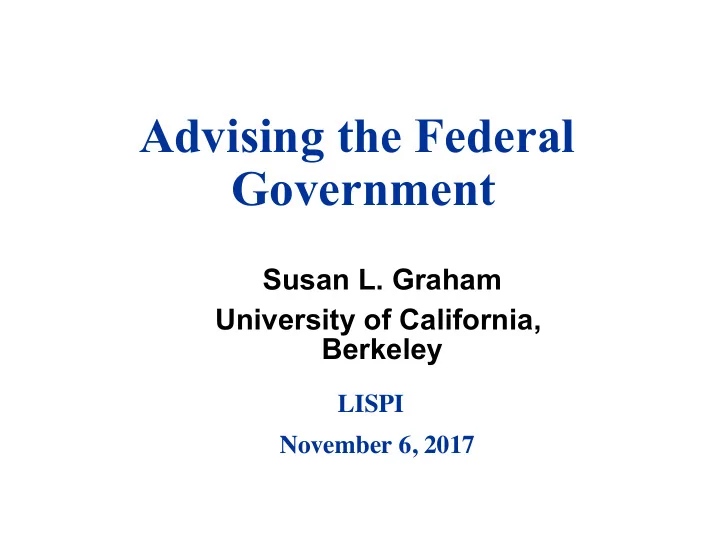

Advising the Federal Government Susan L. Graham University of California, Berkeley LISPI November 6, 2017
How does the Government Learn about Science and Technology (Policy)? ● Hires experts ● Workshops (e.g. CCC-sponsored) Beth ● Professional societies ● National Research Council ● Computer Science and Telecommunications Board (1986) Lyn ● Forum on Cyber Resilience (2015) Fred ● Federal Advisory Committees LISPI November 6, 2017
Science Advice to the President ● 1941-1947 – Office of Science and Technology Development ● Created during WWII ● 1951-1973 – President’s Science Advisory Committee ● Part of office of defense mobilization ● Moved to White House in 1957; abolished in 1973 ● 1976-now – Office of Science and Technology Policy ● Established by Congress LISPI November 6, 2017
Current Advisory Structure President’s Science Advisor PCAST OSTP NSTC National Office of the Technology Security and Chief Environment Science and International Technology and Energy Innovation Affairs Officer LISPI November 6, 2017
My First Meeting – November 2013 LISPI November 6, 2017
Big Data and Privacy • May 2013 – Snowden released classified documents • Jan 2014 – POTUS requested 2 reports • Podesta – policy study • PCAST – technology study • I chaired the PCAST study with Bill Press • POTUS wanted reports in 90 days LISPI November 6, 2017
April 2014 LISPI November 6, 2017
NITRD Reviews LISPI November 6, 2017
Technology and the Future of Cities LISPI November 6, 2017
Technology and Aging Letter report on hearing Prevalence of hearing loss in the U. S. 2001–2008. • Social connectivity and emotional health • Changes in cognitive ability • Changes in physical ability LISPI November 6, 2017
The Science in Forensic Science DNA analysis – single source and • simple mixtures DNA analysis – complex mixtures • • Bitemark analysis • Latent fingerprint analysis • Firearms analysis • Footwear analysis • Hair analysis • Foundational validity • Validity as applied What about digital forensics? LISPI November 6, 2017
Lessons Learned Computing is ubiquitous – it’s always relevant. We are the experts – it’s important that we participate. Policy must be resilient in the face of change. Advising informs our own research - the opportunities to learn are enormous. A good advisor understands what’s needed and how to provide it. If you do a good job, you’ll be asked again. LISPI November 6, 2017
Questions? LISPI November 6, 2017
Recommend
More recommend